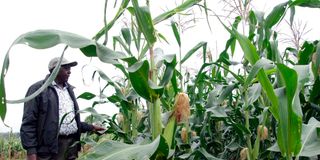Re-thinking leadership in our food system

Mr John Wambugu inspects a maize demonstration plot at Wambugu Agricultural Training farm in Nyeri town on November 17, 2022.
Log onto social media, read the news, listen to conversations in social gatherings, and you will notice a common thread: people are decrying the lack of good leadership.
Across all sectors of our society, not just in the political sphere, we’re beginning to wake up to the fact that good leadership is lacking, and this is aggravating the problems that we grapple with today.
From the state of our schools to the state of our churches, down to the state of our families, the question resonates, where did all our great leaders go?
And perhaps one of the sectors that is in the direst need of good leadership is agriculture, because it is so intricately linked to our survival. According to the annual flagship State of Food Security and Nutrition (SOFI) Report 2023, it is estimated that 600 million people across the world will be food insecure by 2030. African nations remain hardest hit by food insecurity, and this begs the question, “What can we do to buck this trend?”
To address food insecurity, experts have worked hard to assess the key bottlenecks in our broken food systems, including lack of coordination among stakeholders, lack of credit access to farmers, lack of inclusive policies, climate change, conflict, and not applying a gender lens to interventions.
There are several initiatives that have been launched in Kenya to tackle these issues such as the Bottom-Up Economic Transformation Plan, Agricultural Sector Transformation and Growth Strategy and the National Agricultural Investment Plans. Even with the introduction and implementation of some of these interventions, the food insecurity prevails.
So what are we getting wrong?
What’s missing in our approach is good food systems leadership which challenges practitioners not to address one issue at the expense of another. By observing the food system through a wider lens, we can appreciate the complexity of issues we’re facing and map the value chain actors and the different drivers in play, including policy, people and processes.
Take for example the paradox of climate and nutrition and the unintended consequences on women. Upskilling women to employ climate-smart practices in their farms would increase their incomes, improve the environment, and contribute to climate change mitigation.
The unintended consequence would subsequently be the increase in women’s labour and workload which takes away from their child caring capacities, which in turn affects children’s nutrition. To address this paradox, a systems thinking approach is required to map these scenarios before they are evident and build solutions into the intervention.
The lesson is that you cannot address women’s upward economic mobility without also working to dismantle the patriarchal conditioning that makes them primary caregivers at home.
Therefore, there is a great need for leaders in agriculture to think and act differently and adopt a systems approach to tackle the complex and interconnected challenges within food systems. We are trying to do just this within the African Food Fellowship, an initiative that is working to strengthen food systems leadership in Africa.
Now in its second year, the Fellowship is a community and network of food systems leaders, practitioners and industry actors using systems thinking and practice to create healthy, inclusive, and sustainable food systems.
We need to let go of the myth of the lone hero or superstar as a catalyst of change. Instead, we must work to decentralise the concept of leadership because everyone, no matter what position they occupy, has a role to play towards realising good outcomes. Shared efforts, shared glory.
Brenda is the Kenya Implementation Lead and Dean of the African Food Fellowship





